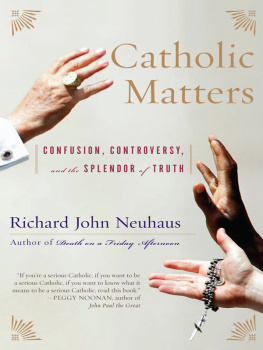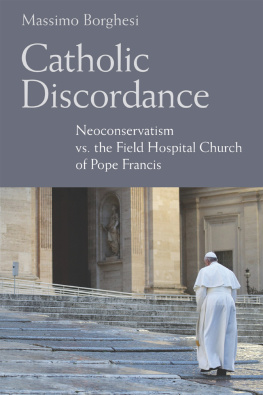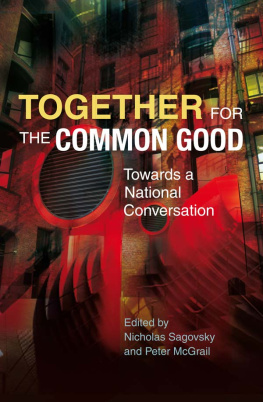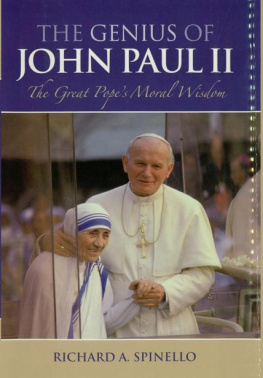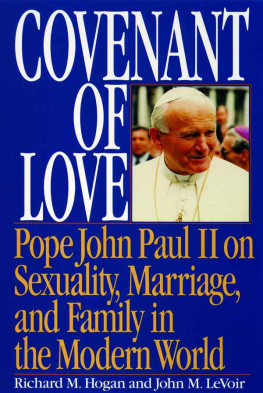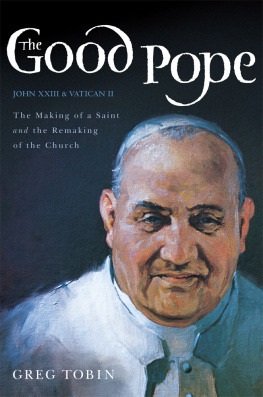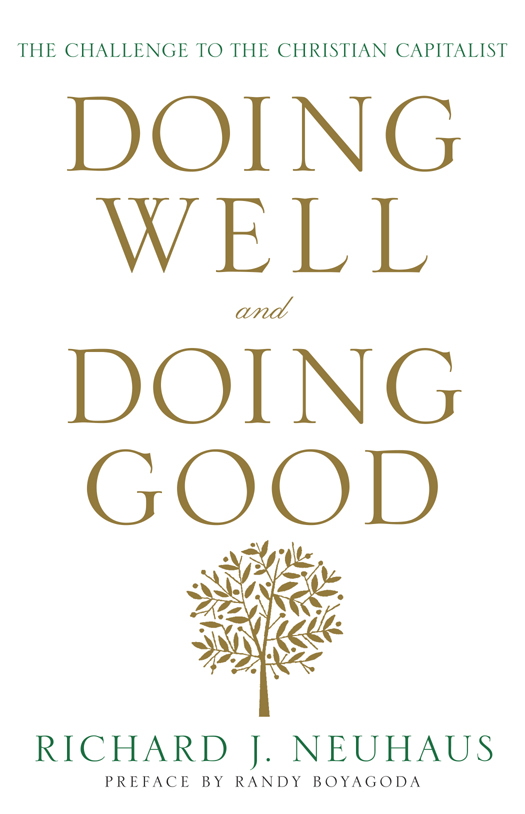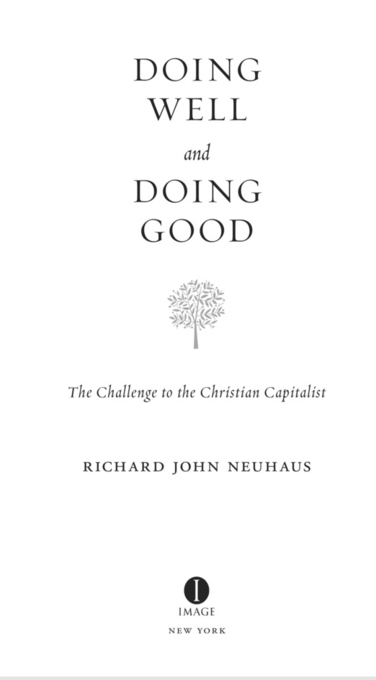SOME OTHER BOOKS BY RICHARD JOHN NEUHAUS
In Defense of People
Christian Faith and Public Policy
Time Toward Home
To Empower People (with Peter Berger)
Freedom for Ministry
The Naked Public Square
The Catholic Moment
America Against Itself
Copyright 1992 by Richard John Neuhaus
The , The Economics of Human Freedom, is a condensation of the papal encyclical Centesimus Annus. The condensation first appeared in the August/September 1991 issue of First Things: A Monthly Journal of Religion and Public Life
All rights reserved.
Published in the United States by Image Books, an imprint of the Crown Publishing Group, a division of Random House, Inc., New York.
www.crownpublishing.com
IMAGE and the Image colophon are registered trademarks of Random House, Inc.
Originally published in hardcover in the United States by Doubleday, a division of Random House, Inc., New York, in 1992.
Library of Congress Cataloging-in-Publication Data
Neuhaus, Richard John.
Doing well & doing good : the challenge to the Christian capitalist /
Richard John Neuhaus.
p. cm.
1. Sociology, Christian (Catholic) 2. EconomicsReligious aspectsCatholic
Church. 3. CapitalismReligious aspectsCatholic Church. 4. Social ethics. 5. LibertyReligious aspectsCatholic Church. 6. Church and social problemsCatholic Church. 7. Catholic ChurchDoctrines. 8. Catholic Church. Pope (1978: John Paul II). Centesimus annus. I. Title. II. Title:
Doing well and doing good.
BX1753.N484 1992
261.85dc20 92-8752
eISBN: 978-0-307-95562-3
Cover design by Laura Duffy
v3.1
To Peter and Brigitte Berger
with gratitude
for the constancy of friendship
in the turnings of turning it around
CONTENTS




Preface to the Twentieth-Anniversary Edition
BY RANDY BOYAGODA
I recently came across a painting of Christ expelling the moneylenders from the temple that had an informative slogan emblazoned across the top: The original Occupy Wall Street Protester. Never mind what the Bible says; thats who Jesus really was! If only the relationship between God, man, and money were so clear, so assured. Granted, its rhetorically provocative and appealingly simple, but the notion that Christianity completely condemns business reduces divine revelation and centuries of sacred teaching to polemical criticisms and defenses, which turns religion itself into an instrument of partisan politics and class warfare, instead of a brace against both. Equally disordered are righteous counter-versions of the connection between Christianity and business, which find in the Gospels little more than holy encouragement to work toward endless individual affluenceto embrace a doctrine of Divine-sanctioned greed. Whether its drafting Christ into the Occupy Movement, or rewriting Christs Gospel as a Prosperity Gospel, such efforts reveal the same truth about God, man, and money, as the late Father Richard John Neuhaus describes it: In the confused structures and patterns of behavior that we call economics, our understanding of Christian truth is always being tested, even as we test other claims to truth by the standard of Christian revelation.
This elegant and sharp-eyed formulation comes from DoingWell and Doing Good, Neuhauss 1992 exploration of the necessary challenge of a Christian capitalist: to seek financial success and moral excellence without presuming the one makes the other impossible, or pretending these are one and the same. The book was originally published two years after Neuhaus made national news in converting from lifelong Lutheranism to Roman Catholicism, and in the midst of his thriving, often controversial career as a public theologian and piquant commentator on religion and public life. Doing Well and Doing Good was Neuhauss enthusiastic answer to Centesimus Annus, Pope John Paul IIs 1991 encyclical about work, dignity, and human freedom. In that encyclical, which more broadly considered the spiritual, cultural, and political implications of the fall of Communism for individuals and societies both, John Paul offered unprecedented papal support for capitalismif not, importantly, an uncritical endorsement, either personally or ecclesiastically. More precisely, the Pope recognized the possibility, indeed the necessity, in our modern age, of a capitalism that was morally attuned to the higher significance of economics itself, as a meaningful context for the ethical playing out of the human persons free and creative capacities to sustain self and family while simultaneously contributing to the greater good and demonstrating the individual liberties that are constituent of genuinely free societies.
Neuhaus writes out of vital sympathy with this premise, but he makes it clear, up front, that much of what follows deals with economics, and the author is keenly aware that he is not an economist. He immediately invites us to regard this seeming limitation as a virtue. Why? Because just as war is too important to be left to the generals economics is too important to be left to the economists. That is, to think about economics as a meaningful dimension of the greater complex of human experience and social life is to think of many, many other things, a sensibility that Neuhaus models in lively abundance throughout this book. To be sure, in the main, Doing Well and Doing Good offers a neoconservative American Catholics vigorous reading of papal encyclicals, of church social teachings, of the principles, policies, and philosophies of democratic governance, and of Marxist and capitalist economic theories. Indeed, the book was originally received, often praised, and in some quarters, panned, based on Neuhauss treatment of this set of subjects, through which he locates and develops, in sacred scripture, Catholic theology, and modern Western philosophy and political theory, an account of the ethical goods and practical advantages of wealth creation, for individuals as much as for societies.
Many of the reviewers who found Neuhauss proposals unpersuasive were perhaps too mindful of the books beginnings, in a far more polemically sharpened essay Neuhaus published in the Wall Street Journal upon the publication of Centesimus Annus. That essay was too easily taken up into the news cycle as an overreaching claim, on Neuhauss part, for understandings of the Pope as suddenly an enthusiastic apologist for capitalism, which only encouraged Neuhauss critics to regard him as the same. Fortunately, this book expands and refines Neuhauss too hasty newspaper argument, and, in so doing, counteracts that wrongful perception of the Pope and Neuhaus alike. One way this occurs is in recognizing how much more than merely economics this book offers, in telling a contemporary story of




